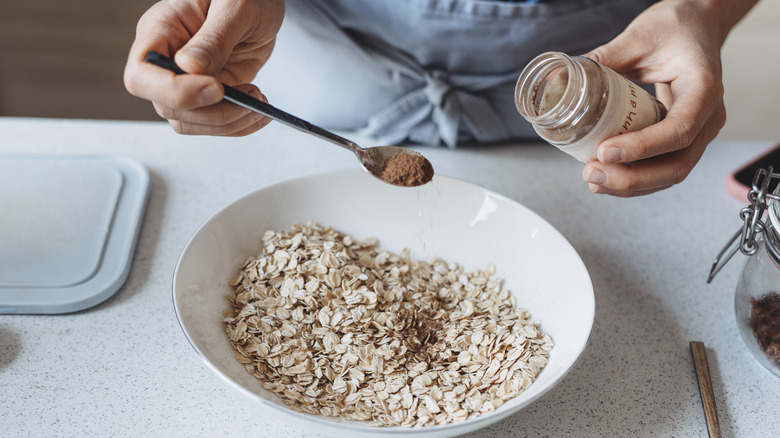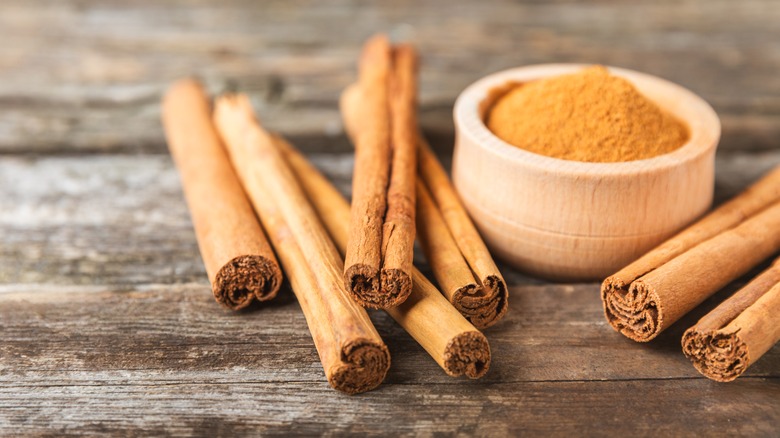Eating Cinnamon Has An Unexpected Effect On Your Bones
The seasons of fall and winter are usually associated with the flavor of cinnamon. Whether it's homemade cinnamon rolls or cinnamon crumble apple pie, the spicy, sweet, and comforting aroma of this popular spice is something we've come to love.
Historically, cinnamon was considered sacred, with Romans burning the spice at funerals, until it eventually became an important traded commodity. From being used for medicinal purposes and as an embalming agent to flavoring food and being used as a preservative, it's safe to say that we've found many uses for this plant. Native to the mango-shaped island nation of Sri Lanka (from where most of the world's supply of Ceylon cinnamon comes), India, and Myanmar, cinnamon is now cultivated in places like South America, West Indies, Indonesia, China, and Vietnam.
While Ceylon cinnamon, also known as Cinnamomum verum, is typically considered the "true" cinnamon, there are other varieties, like Cinnamomum burmannii (Korintje cinnamon), Cinnamomum cassia (Saigon cinnamon), and Cinnamomum loureiroi (Royal cinnamon). The spice is thought to have antioxidant, anti-inflammatory, and lipid-lowering properties. Additionally, it's been associated with preventing diabetes, combating cancer risk, and protecting you from heart disease. Eating cinnamon has an unexpected effect on your brain health too. Turns out, there's even more than meets the eye with this humble spice. Cinnamon can prevent bone loss as well.
Cinnamon and bone health: The science explained
Cinnamon contains a few nutrients that contribute to overall bone health — potassium, calcium, vitamin A, and vitamin K.
Dietary potassium helps maintain bone density by neutralizing acid load and reducing calcium loss, while calcium has always been linked to overall bone health. Whether it's maintaining bone strength or structure, aiding bone development, preventing the weakening of bones, or combatting conditions like osteoporosis, calcium plays a key role in all of these areas. While the research pertaining to vitamin A and bone health is not entirely clearcut (too much and too little has been associated with negative effects on your bones), average consumption of 2,000 to 3,000 international units (IU) a day is thought to be associated with higher bone mineral density (per Harvard Health), which means lesser chance of fractures. With vitamin K, insufficient levels of this fat-soluble vitamin have been linked to low bone density and increased risk of fractures.
There is another unexpected (and indirect) way in which cinnamon could benefit your bones. It has to do with the spice's role in treating a chronic inflammatory condition known as rheumatoid arthritis (RA). Rheumatoid arthritis doesn't only affect your joints. It can have an impact on your skin, eyes, lungs, heart, blood vessels, and bones too. For example, painful swelling that affects your joints can lead to bone erosion. According to a 2018 study published in the Journal of the American College of Nutrition, cinnamon supplements seemed to reduce two proteins associated with inflammation in RA — C-reactive protein (CRP) and tumor necrosis factor-alpha (TNF-a). TNF-a influences cartilage and bone destruction in RA.
How to consume cinnamon for bone health
If you've ever cooked with cinnamon, you'd know that it can be purchased in bark or powder form. Drinking cinnamon tea every day is another easy and soothing way to enjoy the spice.
While the coumarin content, particularly in Cassia cinnamon, is problematic when consumed in large quantities (we're talking more than half a teaspoon daily), adding a pinch of cinnamon as flavoring to your curries, smoothies, baked goods, etc. is considered safe. Too much coumarin — a compound found in other plants too — has been linked with kidney, liver, and lung damage. If you're concerned about this, you may want to try looking for Ceylon cinnamon, which contains far less coumarin than Cassia cinnamon.
As for cinnamon supplements, experts warn that they might not be the best idea. On top of the fact that you can easily get the dose you want with a pinch of the powdered spice, cinnamon pills come with the unexpected risk of not being regulated well enough, explained anesthesiologist and registered dietitian Dr. Christine Gerbstadt (via Everyday Health). "My concern is in the quality of the supplement and also the effect of the supplement depositing a potentially concentrated supply to the intestinal lining. Eating the ground spice spreads the particles with other food items, which may be better tolerated in the GI tract," added the expert.



